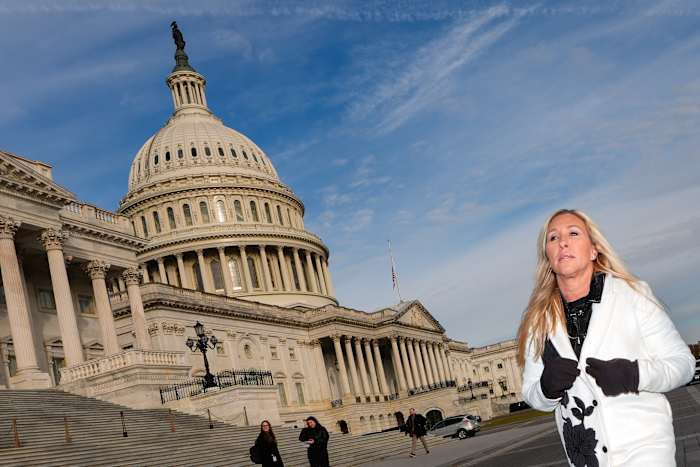Share this @internewscast.com

ATLANTA – In the tumultuous sphere of President Donald Trump’s political landscape, one principle consistently emerges: allies and adversaries are never permanent. This adage may soon be tested by Rep. Marjorie Taylor Greene, the Georgia congresswoman who recently declared her intention to leave Congress in January.
Throughout Trump’s political journey, he’s had numerous clashes with fellow Republicans. These individuals, aware of Trump’s influence within the party, often find their way back to him, sometimes landing significant roles in his administration. Greene, however, presents a unique case as she navigates this unpredictable dynamic.
On a recent Saturday, Trump exemplified this fluctuation by labeling Greene as “a nice person,” shortly after having branded her a “traitor.” This highlights the unpredictable nature of his relationships.
Initially a prominent supporter of the “Make America Great Again” movement, Greene backed Trump’s unfounded claims of election fraud in 2020 and mirrored his combative approach. Her trajectory contrasts with that of many Republicans who, despite initial reluctance, eventually embraced Trump’s reshaping of the GOP. These mainstream conservatives often cited ideological concerns or democratic principles before eventually aligning with his vision.
However, the rift between Greene and Trump did not stem from deep ideological divides or critiques of character. Instead, their falling out revolved around disagreements on specific issues like the Jeffrey Epstein files and health care policies. Greene’s impending departure positions her as the most notable MAGA figure to part ways with Trump, leaving the implications of this split for both parties yet to unfold.
In her announcement video, Greene emphasized her dedication to Trump and the Republican cause, stating, “I have fought harder than almost any other elected Republican to elect Donald Trump and Republicans to power.” Her departure marks a significant shift in the MAGA landscape and raises questions about the future dynamics within Trump’s circle.
“It’s all sort of out of left field,” said Kevin Bishop, a former longtime aide to Sen. Lindsey Graham, a stark example of a Trump critic-turned-ally. What’s clear, Bishop said, is that Trump, even with lagging approval ratings overall, retains “great sway over the activists and, frankly, all corners of the Republican Party.”
A ‘transactional’ president has long subdued internal GOP critics
Trump was not always the undisputed center of Republican power and identity. Even as he took control of a crowded GOP presidential field in 2016, his rivals pummeled him.
Graham, the South Carolina senator, called him a “kook” and a “race-baiting, xenophobic, religious bigot.” Within a few years, he was among Trump’s biggest fans in the Senate, calling him “my president.”
Marco Rubio, then a Florida senator and now Trump’s secretary of state, called him a “con artist” and “the most vulgar person to ever aspire to the presidency.” He and Trump exchanged veiled insults about each other’s male anatomy.
During that same campaign, a young author and future Vice President JD Vance wrote a New York Times op-ed titled: “Mr. Trump Is Unfit For Our Nation’s Highest Office.” Vance’s former roommate disclosed a text message in which Vance compared Trump to Adolf Hitler, Nazi Germany’s authoritarian author of the Holocaust. By 2021, Vance was a first-time Senate candidate from Ohio who sang Trump’s praises on immigration, trade and other matters.
For Republicans who did not make that about-face, their political careers nearly always faced dead ends. Those recognizing the cost of their decisions course corrected.
Sen. Bill Cassidy was among the few Republicans who voted to convict Trump after he left office in 2021. Yet eying reelection in 2026, the Louisiana physician provided Trump the deciding committee vote to confirm the controversial Robert F. Kennedy Jr. as health secretary.
Greene noted the trends.
“Most of the establishment Republicans who secretly hate him and who stabbed him in the back and never defended him against anything have all been welcomed in right after the election,” she said.
Personalities, golf and his own definition of loyalty explain Trump’s approach
Bishop said those flips aren’t simply about politicians being politicians but about Trump bringing the vibes of real estate and marketing to politics.
“He views the presidency as slightly more transactional than maybe the way people in politics view the world,” Bishop said. “A businessman says, ‘Well, we fought over this deal. But in a couple of years maybe we can work together and put together another deal.’”
Bishop, who worked in Graham’s Senate office throughout Trump’s first presidency, said Trump “came out of the hospitality industry” and, despite his harshest policies and rhetoric, is less inclined to judge political opponents and allies in ideological or philosophical terms.
It’s a trait Trump put on display in the Oval Office on Friday in a friendly meeting with New York Mayor-elect Zohran Mamdani, a democratic socialist the president has previously mislabeled as a communist.
Mamdani broke through, perhaps, by doing something Trump appreciates most: winning. Bishop said Graham did it with “a great sense of humor” that Trump appreciated and because they bonded on the golf course. “You spend three or four hours on a golf course,” he said. “That’s a lot of time to get to know someone.”
Graham once offered a simpler explanation, telling The New York Times that his evolution on Trump was a way “to try to be relevant.”
Trump has implicitly opened the door for making up with Greene
It’s notable that one of Greene’s fights –- releasing the Epstein files -– went her way, not Trump’s. The president framed his retreat as something he was fine with all along. Even on health care, Greene can claim some measure of victory. The White House and GOP Hill leaders have countered expiring health insurance tax credits by offering a different potential subsidy: direct payments to consumers as they shop for polices.
Greene certainly has options. She has personal financial security, with her ethics disclosures suggesting a net worth in the many millions of dollars. She has 1.6 million followers on X. She has long been a feature on the conservative media circuit — notably dating Brian Glenn, a right-wing White House correspondent for Real America’s Voice. And her recent break with Trump came with appearances on mainstream media, including ABC’s “The View.”
She could still run for Georgia governor, which will be an open seat, or for the U.S. Senate seat held by Democratic Sen. Jon Ossoff. But Greene acknowledged Trump’s potential power in her heavily Republican House district, saying she wanted to spare her constituents an ugly primary fight.
“Once I left her, she was gone because she would never have survived the primary,” Trump told reporters. He added in a separate NBC interview that the congresswoman has “got to take a little rest.”
Still, the president rebuffed any suggestion that there is any need for “forgiveness” in their relationship, and he told NBC, “I can patch up differences with anyone.”
___
Associated Press writer Will Weissert in Washington contributed to this report.
Copyright 2025 The Associated Press. All rights reserved. This material may not be published, broadcast, rewritten or redistributed without permission.











